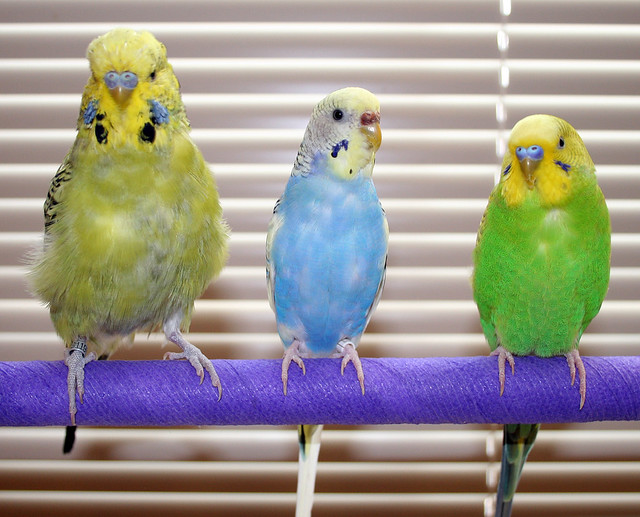 |
| Parakeets - Photo by PuppiesAreProzac |
Parakeets evolved for life in the great Australian Outback. Life in this arid desert-like landscape is not easy. Temperatures can reach well over 100°F, food is scarce, standing water can be very difficult to find, and predators lurk in the skies as well as in the underbrush. In order to help deal with these harsh conditions, parakeets have developed some unique adaptations.
Food and Water
Most large parrots need access to a huge variety of nuts, fruits, and vegetables in order to be healthy. These things are not readily available to the parakeet. Because of this, the parakeet has shrunken in size compared to other parrots and lives almost entirely off of grass seeds. Grasses are a dependable source of food in the Outback because they can grow even with very little water.
Even though parakeets mainly live on grass seeds, it's important to note that they feed on over 20 different kinds of grasses. This variety helps them get all the nutrients they need. It's important that you provide your pet parakeet with a large variety of seeds as well as formulated pellets in order to keep your pet healthy.
Parakeet bodies have been streamlined to preserve water. If the humidity is high and the temperatures are cool, they can go without drinking for over a week and hardly show signs of fatigue. If you or I were to try this we would die within just a few days.
Because parakeets drink so little, it's important that you keep your bird's water bowl clean and fresh by switching out the water every day instead of just waiting for your bird to drink it all and then refilling it. If you let the water stay for several days it can grow bacteria that can kill your parrot.
Flying Ability
Parakeets are not built for long distance flying. Instead, they enjoy powerful bursts of flight for short distances. A parakeet can take off almost immediately if he thinks his life is in danger and his incredible maneuverability makes him almost impossible to catch, even for stealthy and agile predators like the peregrine falcon. Even though parakeets typically only fly in short bursts, they are nomadic (they never stay in the same place for very long) and during the course of just one day they may end up covering more than 10 miles in their search for food.
Your parakeet needs time outside of his cage every day in order to fly around the house, climb on things, and do a little exploring to get his wiggles out.
Make sure the parakeet cage you buy is large enough for your bird to fly in without snagging his wings on the walls when he gets excited or frightened. The smallest cage for a single bird should be no less than 2 feet long. Also, make sure that your bird has toys to climb on and chew up in order to get some exercise.
you buy is large enough for your bird to fly in without snagging his wings on the walls when he gets excited or frightened. The smallest cage for a single bird should be no less than 2 feet long. Also, make sure that your bird has toys to climb on and chew up in order to get some exercise.
Parakeet Flocks
Parakeets are flock birds that are never seen alone unless they are sick or have gotten lost in their clan. Parakeet flocks can be as small 5 to 10 birds or larger than 10,000! Flocks shrink and grow depending on the availability of food. When times get tough, large groups will break into smaller flocks to avoid fighting over patches of grass when foraging.
The flock provides parakeets with safety from predators as well as a place to make friends and find a mate. Because parakeets are such social animals, your bird will need several hours of attention from you each day unless you have several parakeets to keep each other company. A lonely parakeet is a sad and frightened parakeet.
Parakeets are paranoid
The parakeet's Australian name is "Budgerigar" which means "Little Snack". These poor innocent creatures can be found on the dinner menu of almost every meat-eating animal in the Outback. Because of this, they are horribly scared of almost anything that moves, including humans.
It's important that you carefully earn your parakeets trust before attempting to handle your bird. Never hit your parakeet when he does something wrong and never leaves your bird alone with a dog or cat.
Now that you know a little more about wild parakeets, I hope you will be able to make your pet parakeet feel a little more at home in your family. Good luck to you!
|

No comments:
Post a Comment